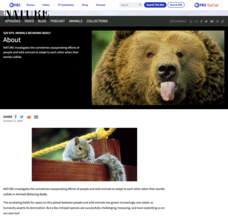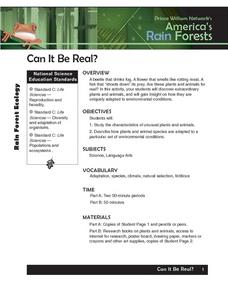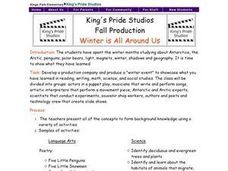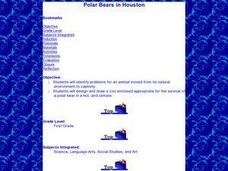Curated OER
Animals and People: Who's Behaving Badly?
Students explore the relationship between human beings and animals. They participate in a variety of activities to examine animal behavior. Students create a class book and stage a mock news broadcast.
Curated OER
Coral Reef Choreographic ProjectTo
Young scholars enhance their understanding of how animals function in a habitat.Students are scattered individually and in small groups. About half of young scholars make coral shapes in small groups. The other half of students move like...
Curated OER
"Habitats"
Students complete a unit of lessons on animals and animal conservation. They observe a square meter of ground outside the school, set up a model environment, analyze an owl pellet, grow bread mold, and explore various websites.
Curated OER
Garden of Eden
Students view a video clip about animals and their habitats. They work together to discuss how different animals adapt to their environments. They create a new habitat for a specific animal and draw new adaptations for them.
Curated OER
Changing Climate, Changing Animals
Students review teacher-provided background materials on impact of climate change. Students then work in small groups to make poster on possible impacts of climate change on one particular northern animal, and how it might affect people...
Curated OER
Camouflage
First graders learn how plants and animals adapt to their environments. In this camouflage lesson, 1st graders watch a movie that explains animal camouflage, design a butterfly that blends into a classroom habitat, create a mini...
Curated OER
Vertebrate Dioramas
Students describe the development of their chosen form of vertebrate life from the past to the present in a four to six page paper. They explain the use of a phylogenetic tree, and use this to exemplify an organism's evolutionary change...
Curated OER
Migration
Students study reasons for and examples of bird migration as a behavioral adaptation. They investigate the Bernoulli's Principles.
Curated OER
Matching Games, Trees and Animals
Students identify and define new words as they are introduced to specific trees, leaves, animals and animal habitats, engage in literacy-related play by playing games that focus on animals and trees mentioned in book, A Tree for Me, and...
Curated OER
America's Rain Forests Can It Be Real?
Students examine the attributes of unusual plants and animals before determining how they are adapted to specific habitat. They complete an associated worksheet. They make posters with information that they find during research sessions.
Curated OER
Houses, Beach Shacks and Cultural Habitats
Learners create a unique habitat by applying the methods of hand building. They draw their idea in their sketchbook. They create the form with expressive variations. They create the decorations using glazes, underglass, stamps and...
Curated OER
Penguins Nesting Know-How
Learners maintain a field journal as they follow penguin parents raising their chicks during the breeding season. They formulate testable questions. Students reflect on animal behavior in the field related to survival and chick rearing.
Curated OER
How Many Penguins Does It Take? Studying Carrying Capacity and Limiting Factors
How does a population's habitat determine the size of that population? Teach learners about carrying capacity and limiting factors with an engaging roleplay activity. Class members pose as a colony of penguins who must gather food amidst...
Curated OER
Get- To Know Mammals
Students take a field trip and record information about mammals. In this mammals lesson, students hunt for tracks, waste, or other evidence that a mammal exists in this habitat. Students complete a worksheet on the evidence they have found.
Curated OER
Alphabetical Autobiography PowerPoint
Sixth graders produce an autobiography, They complete a PowerPoint including one graphic image on each slide, and a subtle or moderate animation. They include 26 slides for each letter of the alphabet, use note pages to present...
Curated OER
Winter is All Around Us
Students present what they have learned on Antartica. Students identify deciduous and evergreen trees and plants; identify and study about the habitats of animals that migrate, hibernate, and adapt; study the Aurora and Aurora Borealis...
Curated OER
Hawaii's Freshwater Animals - Species Report
Students explore biology by creating a report for the class. In this oceanography instructional activity, students research and identify the survival characteristics of a list of freshwater animals by utilizing the Internet and library....
Curated OER
What's Wild
Third graders discover the differences between wild and domestic animals. In this animal lesson plan, 3rd graders chart the differences in the animals and look through magazines for pictures of wild and domestic animals to glue to a...
Curated OER
Polar Bears in Houston
First graders read a book about animal babies from the Arctic and discuss what a polar bear needs to survive. They design a suitable zoo habitat for a polar bear using crayons and paper.
Curated OER
Animals Dotted Tracing Activity
In this tracing worksheet, students trace 3 words related to animals: adapt, camouflage and habitat. A reference web site is included for additional activities.
Curated OER
How Animals Meet Their Needs
Fourth graders research the Internet for facts relating to the animal of their choice. They use information from their Internet search to complete their animal project. TLW use his or her own words when writing their report.
Curated OER
Alligator
Students create a model of an alligator out of clay using both artwork and research to guide their finished work.
Curated OER
Tackling Taxonomy
Students study physical characteristics of separate phyla and place them into similar groups. This lesson is part of a multi-segmented unit on the diversity of life. students develop a classification system by grouping animals into...
Curated OER
Goals of the Diversity of Life Unit
Students are introduced to the unit on the importance of diversity of life and the role that interdependence plays in our worlds. this is part of a multi-lesson unit on the diversity of life.























